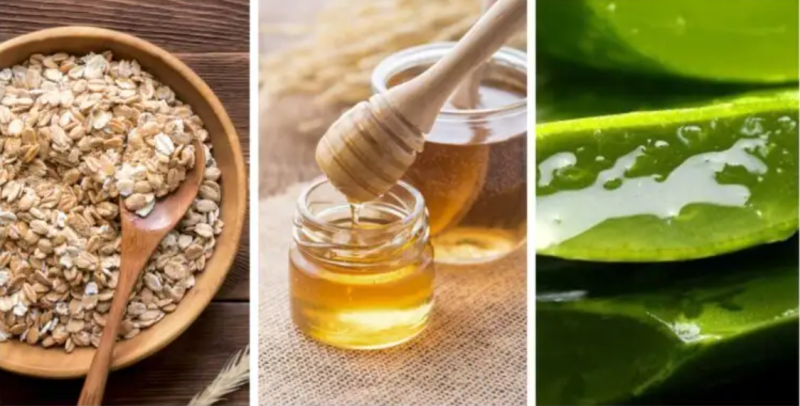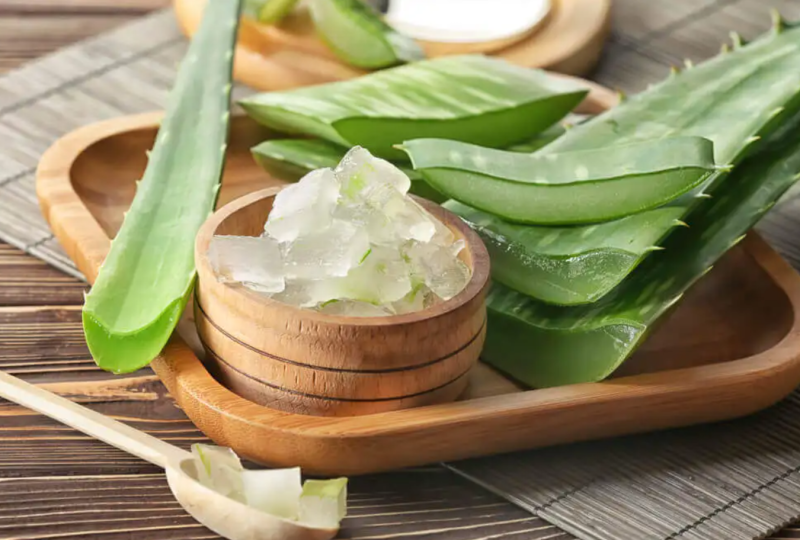
Seborrheic dermatitis, commonly known as “seborrhea,” is a chronic skin condition that causes scaling and poorly defined erythematous patches. Natural remedies for seborrheic dermatitis are part of the conservative treatment.
They are handy for episodes with mild and moderate symptoms. Of course, consulting with the specialist before including any remedy as part of the treatment routine is very important.
Contents
Five natural remedies to relieve seborrheic dermatitis that can help you
As an article published by the National Library of Medicine rightly states, experts use topical and systemic agents and physical treatments to address it. However, these can be complemented with the help of natural remedies for seborrheic dermatitis.
In fact, according to a study carried out by several researchers from Columbia University in 2010, the objective of conventional treatment for this type of dermatitis revolves around inhibiting skin colonization by fungi, reducing itching and erythema, loosening crusts and scales, and minimizing inflammation. You can achieve all this with the help of the following natural remedies for seborrheic dermatitis.
1. Oats, the best for seborrheic dermatitis
Oatmeal is a cereal that has anti-inflammatory properties, as an article published in Actas Dermo-Sifiliográficas warns. For this reason, it has been included as an ingredient in various cosmetic products for sensitive skin care and seborrheic dermatitis outbreaks.
 Homemade oatmeal masks and compresses can relieve itching, swelling, and redness. In addition, oats affect the growth, metabolism, lactic acid production, and expression of skin bacteria. This is why it can help with other skin conditions triggered by pathogens of this type.
Homemade oatmeal masks and compresses can relieve itching, swelling, and redness. In addition, oats affect the growth, metabolism, lactic acid production, and expression of skin bacteria. This is why it can help with other skin conditions triggered by pathogens of this type.
2. Coconut oil
There is evidence that coconut oil has the property of regulating the metabolism of bacteria and fungi. Specifically, according to research at the Indian Institute of Education and Scientific Research in Bhopal, 140 women, after 12 weeks of treatment with coconut oil, managed to prevent hair dandruff and cleanse the scalp.
In addition, specialists, as the following study published by the Journal of Traditional and Complementary Medicine maintains, have attributed anti-inflammatory and skin-protective properties to it, making it one of the best home remedies for seborrheic dermatitis.
All you have to do is apply a few drops and gently massage the area for an hour, then brush your hair carefully and finally wash it with lukewarm water and the products recommended by the dermatologist (mild shampoos, such as baby shampoos or those that do not contain alcohol).
Of course, although some media suggest using olive oil for the same purpose, the truth is that it is contraindicated. According to a paper published in the Archives of Pediatrics & Adolescent Medicine in 2012, it is discouraged because it can encourage the growth of Malassezia yeasts.
3. Aloe vera
The aloe vera plant is used in multiple treatments for the skin and hair. The natural gel of the plant has astringent components that hydrate the skin, preventing water loss. In addition, it helps to cleanse the skin, relieve inflammation and promote cell regeneration.

Alore vea, as well maintained by a study carried out by several researchers from George Washington University, has positive results along with other herbs to treat seborrheic dermatitis. It is beneficial for addressing symptoms such as dry and itchy skin.
What should you do?
- For seborrheic dermatitis, extract the gel from an aloe leaf and process it to facilitate its application.
- Use the gel to massage the problem area and let it act for 20 minutes.
- After the indicated time, rinse the skin with lukewarm water.
4. Zinc
A study published in 2019 by the Turkish Journal of Medical Sciences clearly shows that people who develop this type of dermatitis have the lowest zinc levels compared to people without the condition.
As noted by researchers from India’s Department of Dermatology, Venereology, and Leprosy, it is often used as an adjunctive treatment for skin conditions such as warts, leprosy, genital herpes, dermatophytosis, psoriasis, acne, and of course, dermatitis.
In the current market, you can find shampoos, facial creams, soaps, facial cleansers, and others with this compound. You can also opt for supplements or a diet rich in foods with zinc. That is red meat and white meat, mainly.
5. Honey
Due to its pleasant texture, honey can help alleviate mild outbreaks of seborrheic dermatitis. In addition, it can help moisturize the skin, thus relieving irritation and itchiness, according to the results of a 2016 article published in the Central Asian Journal of Global Health.
 To make a home remedy with honey, you can use egg whites as a second ingredient or just water.
To make a home remedy with honey, you can use egg whites as a second ingredient or just water.
Ingredients
- One cup of boiled water (250 ml).
- Two tablespoons of honey (50 g).
What should you do?
- Pour the boiled water into a container, add the honey, and mix well.
- Apply to the affected areas with a massage and leave to act for two hours.
- Rinse with lukewarm water.
It is one of the preferred remedies, and you can administer it once every two days.
Habits to control seborrheic dermatitis
To care for your skin correctly when diagnosed with seborrheic dermatitis, you must go to a dermatologist and follow all his recommendations. The professional will know what is best for your skin according to its characteristics and needs. In the process, you can take into account the following habits in your day-to-day:
- Reduce stress levels in your day. High levels can exacerbate episodes and symptoms, according to Dr. Leyre Aguado Gil, from the Clínica Universidad de Navarra.
- Include probiotics in your diet. Some studies, like the one below published in 2021 by Biomedicines, suggest that they may positively affect chronic skin conditions.
- Take care of your sleep hygiene. Incomplete night rest can increase your anxiety, your stress and weaken your immune system.
- Apply cold compresses to the affected places. Although it is a comforting therapy, it can prevent you from scratching the areas and mediate its complication.
- Avoid fatty foods, fried foods, and dairy products. Do it, especially if you notice a relationship between exacerbations and their intake.
- Increase the intake of omega 3. It has been suggested, according to a study in the Journal of Cutaneous Medicine and Surgery, that it has positive effects on severe dermatological conditions.
Also, remember to include a skincare routine based on moisturizing products. Follow the indications provided by the specialist, so assume these natural remedies for seborrheic dermatitis only as adjuncts to the primary treatment.